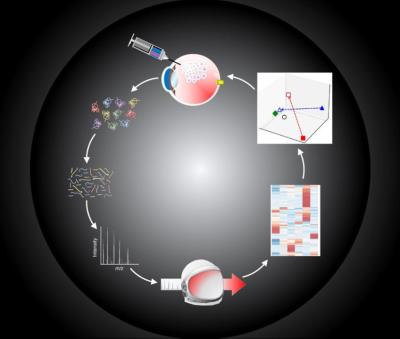
Schematic summarizing the research by Sodhi’s team. Fluid was collected from the eyes of patients with wet macular degeneration receiving treatment with anti-VEGF therapy. Analyses on the proteins in this fluid were performed to identify biomarkers that may help predict those patients who can be safely weaned off treatment within one year. Credit: Isabella Sodhi and Adriana Sodhi.
In a preliminary study of 106 people with “wet” age-related macular degeneration, Johns Hopkins Medicine researchers report that as many as a third of those with the blinding retinal disease may someday be able to safely stop eye injection therapy without further vision loss. The findings, say the researchers, fall short of setting a timeline for ending treatment or predicting precisely which patients can stop injections, but they say the results add to growing evidence that many people with the disease may not need the lifelong monthly medication currently recommended.
The findings, the investigators say, also point to specific proteins produced at different levels in the eyes of those who stopped therapy, which may lead to the development of a test to accurately identify who may be weaned off medication.
“Such a test could let us tell patients early on how well they would do and when they might be able to stop,” says Akrit Sodhi , M.D., Ph.D., associate professor of ophthalmology and the Branna and Irving Sisenwein Professor of Ophthalmology at the Johns Hopkins University School of Medicine and Wilmer Eye Institute.